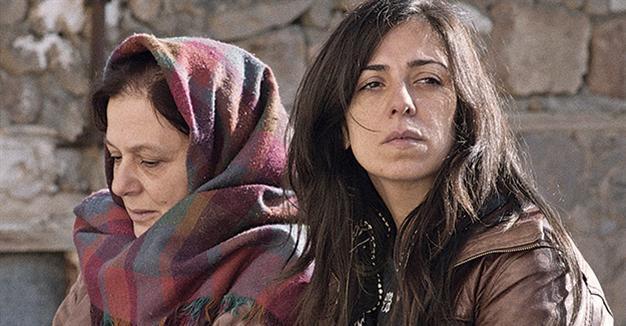Women’s film festival set to kick off in Ankara
ANKARA
 The Flying Broom Women’s Film Festival will be held in the Turkish capital city of Ankara for the 19th time between May 5 and May 12.
The Flying Broom Women’s Film Festival will be held in the Turkish capital city of Ankara for the 19th time between May 5 and May 12.The festival opens on May 5 with three screenings at the Kızılırmak Movie Theater, while the official opening ceremony will be held on May 6.
The only international women’s films festival to which the International Federation of Film Critics (FIPRESCI) sends a jury, the Flying Broom will feature more than 100 films this year, 12 of which will compete for the FIPRESCI Award.
Veteran Turkish actress Selda Alkor will receive the Honorary Award, while the Bilge Olgaç Success Awards will be presented to director Bingöl Elmas, cinematographer Meryem Yavuz and voice actress Tülay Bursa.
The festival’s films will be screened at the Kızılırmak, the Contemporary Arts Center and the German Cultural Center. While the screenings at the latter two will be free of charge, the tickets for Kızılırmak will be available for 5 Turkish Liras.
The films which will compete for the FIPRESCI Award include:
“As I Open My Eyes,” Leyla Bouzid: Set on the eve of Tunisia’s Jasmine Revolution, the first feature from director Bouzid follows an up-and-coming underground band as they are pulled in all directions by creative energy, authoritarian oppression and rebellion.
“Mountain,” Yaelle Kayam: A devout woman is living with her family in the Jewish cemetery on Jerusalem’s Mount of Olives. During the day, while her husband and children are at school, she is left alone on the mountain. She goes for walks in the cemetery, trying to escape the endless house work.
“Pioneer Heroes,” Natalya Kudryashova: Olga, Katya and Andrey are three friends who had very different dreams as children. In search of happiness, they leave the countryside for Moscow. Their lives caught between the dreams of a childhood spent in the Soviet Union and the realities of contemporary Moscow.
“The Wednesday Child,” Lili Horváth: As a 9-year-old, Maja was abandoned by her mother and placed in an orphanage. Now it is ten years later and she keeps returning to the institution to visit her own four-year-old son. Will she be able to take control of her life despite the unfavorable circumstances and her own self-destructive tendencies?
“Ma,” Celia Rowlson-Hall: In this modern-day vision of Mother Mary’s pilgrimage, a woman crosses the scorched landscape of the American southwest. Reinvented and told entirely through movement, the film playfully deconstructs the role of this woman, who encounters a world full of bold characters that are alternately terrifying and sublime.
“The Gulls” (Chaiki), Ella Manzheeva: Elsa, a fisherman’s wife, lives in a seaside town in Kalmykia. She wants to leave her husband, but doesn’t dare do so for fear of the unknown. However, Elsa’s husband dies. Her husband’s death forces the heroine to reflect and reconsider her views on life, happiness and freedom.
“Summertime,” Catherine Corsini: In 1971 France, a young girl from a rural family moves to Paris and begins a life-changing affair with a feminist activist.
“Song of Songs” (Pesn Pesney), Eva Neyman: Rooted in the Yiddish folklore of Sholem Aleichem’s short stories, Eva Neymann’s tender third feature is a delicate and affecting coming-of-age story set in a Ukrainian shtetl at the beginning of the 20th century.
“Sworn Virgin” (Vergine Giurata), Laura Bispuri: Hana is growing up in an archaic alpine landscape in Albania where the old codes and traditional gender roles prevail. She escapes the fate of a wife and servant when, in accordance with the Kanun, the traditional Albanian law, she pledges herself to life-long virginity, thus sacrificing her femininity for perceived freedom.
“Motherland,” Senem Tüzen: Nesrin is an urban, upper–middle class woman recovering from a divorce. She’s quit her office job, abandoned her house in Istanbul and come to the village house of her deceased grandmother to finish a novel and live out her childhood dream of being a writer.
“Evolution,” Lucille Hadzihalilovic: A young boy living in a mysterious, isolated seaside clinic uncovers the sinister purposes of his keepers, in this mesmerizing blend of body horror and surreal fantasy from director Hadzihalilovic.
“Things to Come” (L’avenir), Mia Hansen-Løve: Nathalie teaches philosophy at a high school in Paris. She is passionate about her job and particularly enjoys passing on the pleasure of thinking. Married with two children, she divides her time between her family, former students and her very possessive mother. One day, Nathalie’s husband announces he is leaving her for another woman. With freedom thrust upon her, Nathalie must reinvent her life.
















